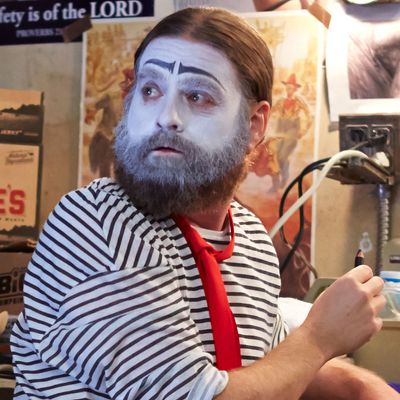
Baskets, about the existential crisis of a rodeo clown, is a bizarre show with a great pedigree that won’t be to everyone’s liking. I watched the first five episodes and still haven’t entirely warmed to it, but my initial impression could be as likely to entice people as scare them away: It plays as if an old Steve Martin picaresque-dumbass movie like The Jerk were done in the style of an earnest, realistic, rather dour indie drama. This seems inevitable once you learn that the series’ creators are Louis C.K., Zach Galifianakis, and Jonathan Krisel of Portlandia.
Galifianakis stars as Chip Baskets, who studies clowning in France — and en Français, yet — then returns to the United States with a beautiful but cold French wife named Penelope (Sabina Sciubba), who admits she’s only marrying him for citizenship. Chip tries to get a job paying the bills with his art but has to settle for being a rodeo clown. (It sure looks like Galifianakis in that arena being chased by bulls; if so, impressive, and damn.)
Stunt casting abounds. Galifianakis plays a second role as Chip’s very successful twin brother, Dale, creator of a “school” that offers online degrees in management. His chirpy ads are everywhere, chiming in on otherwise melancholy scenes. Louie Anderson plays Chip and Dale’s mother; clad in tentlike dresses, unflattering wigs, and perky church hats, he often evokes Aunt Bea on The Andy Griffith Show; eventually you get used to this, but as with certain counterintuitive casting choices on Louie, you have to wonder what point is being made, and whether it’s worth making. Martha Kelly plays Chip’s new best friend, Martha, a car-insurance investigator who meets him while writing up an accident, then eventually reveals herself to be a Costco employee as well — though one perpetually on the verge of being fired for not selling enough executive memberships.
The show’s third episode is about as close to harrowing as a show like this can get without shattering the delicate spell that the writers, filmmakers, and actors have tried, successfully or not, to weave. There’s a tension between the situations being depicted and the show’s look, tone, and rhythm. As in The Jerk, Dumb and Dumber, and Jim Carrey’s early films, Chip and many other characters seem to have just fallen off the proverbial turnip truck yesterday; they are so deeply ignorant of how the world works (how can Chip not understand that a rodeo-clown job entails going into an arena with bulls?) that much of the series falls under the rubric of what a friend approvingly calls “idiot humor.” But the series is set in recognizably real environments, and the photography, editing, and sound design are often as moody and intense as anything in the work of Paul Thomas Anderson (who successfully injected idiot humor into the dour indie drama in Punch-Drunk Love, and remains the only filmmaker I can think of to have pulled this off). Here and there you get splashes of eerie beauty and darkness, as when Chip tries to give Penelope a heartfelt speech poolside at the motel where they share a crappy room; the ethereal blue of the water makes the moment not funny at all, just painful.
A strain of misanthropy runs throughout Baskets. The show seems to feel for its characters, and feel sorry for them, but its empathy is laced with exhaustion, disgust, and contempt. A lot of these darker feelings have to do with the predicament of the artist in 21st-century America. The series seems genuinely sad and angry that most of the drawling ’Murica types surrounding Chip can’t appreciate his art, and there are moments when he describes the non-artist’s life in a sneering or condescending way (at one point he pronounces the words dishwasher and florist as if they’d been dipped in dung). But at the same time, the show finds Chip ridiculous as well: What kind of a fool, after all, would think of becoming an artist in this world, then be angry that he can’t earn a living doing exactly the kind of art he went to France to learn?
Chip’s arrogance and obliviousness undercut any sympathy we might feel for him. Only Galifianakis’s distinctive energy keeps us from finding the character entirely unpalatable. I must confess that I’ve never completely liked Galifianakis, even in roles where the movie seems to want me to love him, and I don’t think that’s a failing. A part of Galifianakis seems to rebel against being loved. When his characters are behaving arrogantly or resentfully, his intense gaze and strident voice channel the young Richard Dreyfuss — not from The Goodbye Girl, where Dreyfuss is insufferably smug yet also brilliant and adorable, but Close Encounters, where he plays a guy who ditches his family to chase a dream image and never looks back.
I just realized I started this review saying I didn’t quite warm to Baskets, but here I am comparing Galifianakis to Richard Dreyfuss in Close Encounters. That’s the kind of show it is. I guess I like it, then. Maybe being not quite like anything you’ve seen is enough. For season one, anyway.


